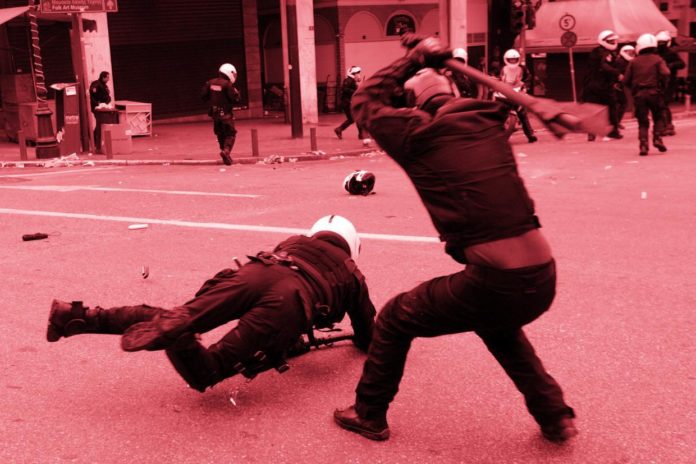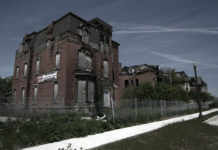Most of us have seen some flavor or another of the dystopian future movie or book. Lately, references to such works as “1984” or “Brave New World” are quite popular, as governmental overreach and information control, as written in these books, seems to be overwhelming. But I’d like to address the other type of negative-utopian future, rather than just governmental totalitarianism: the complete breakdown of civilization. This is the theme of movies such as “Mad Max”, “Escape From New York”, and books such as “One Second After”, and many more—where after civilization ends, society reverts back to ‘only the strong survive’. How close are we to such a future? Let’s dig.
First, why would anyone write or direct such negative works? Of course, part of that is likely fits of fantasy, playing the ‘what if’ games. But part of it is also analyzing trends, both forward and backward—in effect, how were things pre-civilization and how could they be post-civilization? Note that the natural state of things is NOT civilization. Civilizations require work, effort, and vision to maintain. And only in a civilized society are the weak protected from being overrun by the strong. Note that just over 150 years ago, the Wild West of the US was a very real thing, where the law was administered by each individual. Wilderness killed as many people as Native American Indians and outlaws. Hospitals and sheriffs were equally distant from pioneers, so they simply were not part of the mix for most of the explorers and adventurers. Work it out yourself, or die. Our society has progressed much since then, especially the availability of law enforcement and medical services. But if those systems stop, how fast would we revert to our historical past?
Second, do folks realize how thin the veneer of civilization really is? Just because we have grown accustomed to it, doesn’t mean it is everlasting. Events over the last few years should give us serious pause to that kind of thinking. The COVID-19 pandemic, and the governmental reactions to it, should be a fair warning of how tenuous our grip on our everyday lifestyles can be. Supply chain damage alone should make us shiver—more on that below. Severe weather in Texas this past Winter showed how fragile electric and water delivery systems can be. California, our largest State, continually has trouble delivering power to its inhabitants. And the nationwide riots last Summer? If the police and fire departments simply do not show up in times of emergency, how do we fare?
Modern USA is a complicated social construction. While we have extremely densely populated cities, they are no where near where food is produced. The same dynamic is true with critical medicines. And our power grid? If electricity stops, so do water purification systems, heating and cooling systems, and it is no longer posh to live or work on the 30+ floor of ANY building sans elevators. Hospitals can run for brief times on backup power sources, but not long-term. The near-term death toll would be horrendous. Nursing homes would suffer nearly the same fate, once on-hand medicinal stocks run out. Heck, without power, gasoline pumps no longer operate—assuming the trucks delivered the gas in the first place. Trucking in and of itself is as essential to our way of life as blood to a human. Rail has fixed terminal points, usually far from final distribution areas. To get items from the train depots to the stores requires that whole trucking industry be operational. That includes food, medicine, subassemblies and parts that keep nearly ALL of our other industries working.
Our military, based upon annual funding, is the strongest, most capable in the entire world. We rely on them to keep invaders ‘over there’. But what if that process fails? What if we deploy elsewhere so deeply, we have no forces domestically to protect us? Think of how the riots were administered last year, but on a national scale. If you think ammunition is expensive NOW, see what happens when it is an essential good.
Our money supply, such that it is, is now a computer product of electronic deposits and withdraws. Bank accounts are digital representations of currency per account holder. Very little of our currency is actually paper and coin. Take away electricity, those systems fail, too. Can you imagine the type of barter system that would replace it, especially in large cities? In a service economy, one could go from wealthy to destitute in a matter of hours.
Speaking of a service economy: most folks in the US work in a very narrow skill group, with little or no ability to work in another. The specialty trades are not alone—few know how to perform necessary tasks themselves. Rather, they rely on others’ expertise to get things done. Other than the modern farmer, who has to fix nearly every broken system himself, who else knows basic survival skills? Maybe a million people, nationwide?
Note to all of those folks who are anti-gun, anti-violence people: you just END. Violent people, locally and elsewhere, will simply overrun you. The systems that allowed you to exist in the first place may not be operational: military, police, judicial, legal, penal. As I wrote earlier, civilization is the only thing preventing the strong from imposing their absolute will upon you. As in the wild, the strongest and smartest dominate everything else. The physically weakest become…food for the strong. Some will ‘revise’ their stances from peaceful to useful. Those folks are called ‘survivors’.
All of a sudden, the disaster preppers don’t sound so crazy, do they? Storage facilities of survival food, water, ammo, LP gas, gasoline, generators, and other essentials, just went from whimsical to drop-dead necessities. In fact, those items would likely replace worthless paper and coin currency as a method of bartering currency, should existing systems fail. Paper currency would be less useful than toilet paper—and may be used for such. Ammunition and working firearms may be gold-like in stature. We assume our food and clean water availability so much, that we have become picky, trendy, particular consumers. End our distribution systems, what is on hand to survive is critical. I’m betting lactose-intolerance disappears in favor of starvation prevention. Water purification tablets sound bad, but in a true emergency, they may be as critical as air.
How many big-city people will perish due to thirst, starvation, lack of necessary medicine, heat, cold, exertion, and criminal behavior? That is anyone’s guess, as is how long that will take. As the book “One Second After” (a tale about an Electric-Magnetic-Pulse (EMP) explosion over North America, and its effects), the elderly and severely ill will likely die first. Big city living would go from preferable to damning instantly, since they are so far from food source origination points. The looting of grocery stores (and any individuals that had necessities at home) would only sustain folks for so long. The time it takes to start a new garden, even if you had seeds on hand, and the necessary knowledge to pull it off, is simply too long to avoid starvation. In the book, the EMP detonation would disable the computer systems in all post-1977 automobiles and trucks. Thus, distribution systems simply STOP.
Go watch a re-run of “Mad Max” (note how young Mel Gibson looks—it was 1979, after all). And realize that it would not take much of a confluence of factors to make that crazy world a near-reality. Civilization may be miles wide, but its depth is measured in inches.
Thank you for taking the time to read my article! Feel free to add comments (good or bad) in the box below. In addition, there is a link at the bottom of the article to view other items I’ve written at Global Liberty Media. Enjoy!
Welcome!Log into your account





















Lindell, that was a great article. I’ve been saying much the same — and expecting it — for years. Starbucks-sitting types will be the first to succumb.